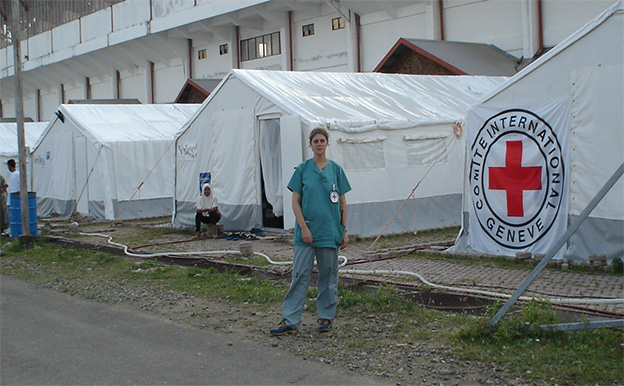McMaster professor praises recovery efforts since ‘horrific’ Boxing Day tsunami

The sight of the ship defies logic: a 2,600-ton iron vessel situated in the middle of a neighbourhood in Banda Aceh, Indonesia. It once rested in the harbour, but was flung five kilometres inland by the devastating wall of water that hit the region almost 10 years ago.
Too massive to move, the former electric generator ship is now a memorial site that attracts tourists.
“You can climb to the top and barely see how far the ocean is off in the distance,” said Dr. Lynda Redwood-Campbell, McMaster professor and coordinator of the Global Health Program within the Department of Family Medicine. “You realize the absolute strength of that tsunami.”
Over the last decade she has travelled to the province of Aceh eight times to assist in recovery efforts. Now, as its 10th anniversary approaches on Dec. 26, Redwood-Campbell is reflecting on one of worst natural disasters that left more than 160,000 people dead.
She is also praising the progress made since the tragedy. Redwood-Campbell said the ship, along with the Aceh Tsunami Museum, are the city’s only two obvious reminders of the tsunami.
“If you walked down the streets of Banda Aceh now, you would have a hard time recognizing that there had even been a tsunami,” she said, adding that everything has been rebuilt and all of the buildings are 10 years old or less.
The scene was different when Redwood-Campbell first arrived with the international committee of the Red Cross, about three weeks after the tsunami, to provide medical care in a field hospital set up by the stadium.
“I saw complete and utter devastation of a magnitude I’ve never seen before and never seen since,” she said. “It was horrific. There were no roads, buildings, power, infrastructure or water. There were people who had lost everything in their lives – their families, their businesses – everything.”
But now, she said, “I’m very impressed with the development they’ve been able to accomplish in the last decade.”
Redwood-Campbell credits three things that have allowed the area to flourish: the signing of the Aceh Peace Agreement in 2005 after nearly 30 years of civil war; foreign financial support to aid the redevelopment; and the “incredible” resilience of the people who were affected by the tsunami.
She has heard harrowing tales of survival and inspiring stories of people rebuilding their lives. “Many of us would have been stunned into inaction, but these people rose up and worked to get things done in spite of adversity.”
For her, the strongest indicator of progress and development is the abundance of bustling coffee shops in the city. She explained this is where locals gather to socialize, as it is part of their culture. “It is a very social place and there are coffee shops everywhere, one on every corner now.”
Another good example of resilience and moving forward, Redwood-Campbell said, is the ongoing partnership between McMaster’s Department of Family Medicine and Syiah Kuala University in Aceh. It developed over eight years as she and her colleagues helped to train future family physicians there. The partnership was formalized in 2013 through the signing of a memorandum of understanding.
These are signs of just how far the area has come in 10 years.
Redwood-Campbell has worked in many resource-poor countries and with the Red Cross on many emergency response missions around the world, including Rwanda, DRC (Congo), Kenya, Honduras, Bangladesh and Haiti. She will never forget the tsunami in Indonesia.
“It was so vast and the amount of people who were killed or affected by it is what strikes me and will always be with me.”
